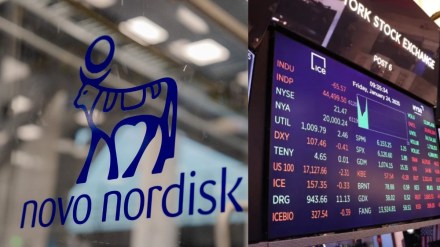Novo Nordisk shares plunged nearly 10% on Monday, hitting 274 Danish kroner ($42.33), their lowest point since 2021. The sharp selloff came immediately after the company revealed that its highly anticipated Alzheimer’s trial for semaglutide, the active ingredient used in Ozempic and Wegovy, failed to meet its main goal.
The results ended hopes among investors that Alzheimer’s could become the next major commercial frontier for the company, at a time when Novo’s valuation has already been shattered over high competition.
Monday’s stock plunge
Monday’s stock plunge adds to a difficult 18 months for Novo Nordisk, during which shares have already fallen more than 50%.
Regardless of an earlier market lead in obesity treatments, Novo has struggled to keep pace with Eli Lilly, which last week became the first pharmaceutical company to reach a $1 trillion market valuation.
Novo has also blamed declining revenue guidance on cheaper compounded versions of semaglutide being sold in the US market.
The company has undergone dramatic leadership changes, including the dismissal of former CEO Lars Fruergaard Jørgensen after an eight-year tenure and the replacement of half the board.
New chair Lars Rebien Sørensen commented that the previous leadership was “too slow in recognising the significance of the market changes in the United States.”
New CEO Mike Doustdar has already shifted strategy toward the company’s core obesity and diabetes franchises and implemented global workforce reductions of more than 10%. Novo also recently lowered prices for some Ozempic and Wegovy patients to counter competition.
Novo’s testing of Alzheimer’s medicine
In the Phase 3 study, Novo tested whether treatment with semaglutide could slow cognitive decline in Alzheimer’s patients by at least 20%. Though the trial showed improvements in Alzheimer’s-related biomarkers, it did not translate into a delay in disease progression.
Novo’s chief scientific officer, Martin Holst Lange, said in a statement, “Based on the significant unmet need in Alzheimer’s disease as well as a number of indicative data points, we felt we had a responsibility to explore semaglutide’s potential, despite a low likelihood of success.”
The failed outcome removed what some analysts viewed as one of the last short-term upside scenarios for Novo’s struggling stock.
As reported by CNBC, Jefferies analysts summarised investor sentiment, “While hopes were not high for a positive readout, potential success had perhaps kept some in the name, with this result removing a near-term upside scenario.”
Alzheimer’s research continues to be one of the largest unmet medical challenges globally. Existing treatments, including Eli Lilly’s Kisunla and Biogen and Eisai’s Leqembi, have shown the ability to slow progression by up to a third but are associated with risks of severe side effects.
Medicines for Alzheimer’s
Novo based its Alzheimer’s pursuit on emerging evidence reveals that GLP-1 drugs may reduce neuroinflammation or slow cognitive decline.
Semaglutide mimics the gut hormone GLP-1, similar to Eli Lilly’s Mounjaro and Zepbound, and is already widely used for diabetes and weight loss.
Top-line trial data will be presented on December 3 at the Clinical Trials on Alzheimer’s Disease conference, with full results planned for the 2026 Alzheimer’s and Parkinson’s Diseases Conference.
